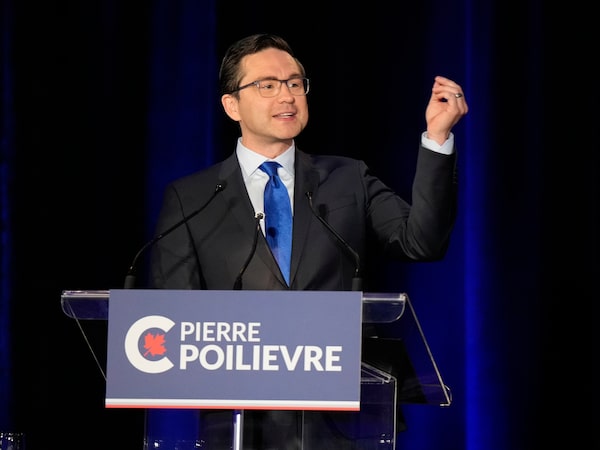
Conservative leadership hopeful Pierre Poilievre takes part in the Conservative Party of Canada French-language leadership debate in Laval, Que., on May 25.Ryan Remiorz/The Canadian Press
Pierre Poilievre’s decision to boycott Wednesday night’s leadership debate confirms the schism between his faction of the Conservative Party and the more moderate faction led by former Quebec premier Jean Charest.
This could be seen as bad news for the party. Traditionally, the conservative coalition has been strongest when Blue Tories and Red Tories work together.
But the years of conservative rift and reunion, of Reformers and Progressive Conservatives and the Canadian Alliance and the reunited Conservative Party are ancient history. None of it matters any more. The Conservative Party is about to become the personal property of Pierre Poilievre.
Mr. Charest did everything in his power, Wednesday night, to make us believe this is not so. With only marginal candidates Scott Aitchison and Roman Baber sharing the stage, he owned the night.
Pierre Poilievre wins fundraising race among Conservative leadership candidates
He spoke passionately about the need for party unity, on Indigenous and transportation issues and resource and environmental issues, on the perfidy of Liberals. He stressed that only he had the qualifications and experience to lead the country.
“You have had enough of losing,” he told fellow Conservatives. “I can win a majority government.”
And he took a clear dig at Mr. Poilievre at the end of the debate. “Leadership is about fighting and showing up,” he said. “It isn’t about running away.”
Everything Mr. Charest said may very well be true. But all available evidence suggests that the only remaining question is whether Mr. Poilievre will take the leadership on the first ballot.
Fundraising numbers suggest he will, and by a lot. Poilievre campaign manager Jenni Byrne stated Wednesday the campaign had raised more than $5.3-million from more than 44,500 contributors.
Add these numbers to the almost 312,000 party memberships generated by the campaign. No candidate for any political party in any leadership campaign in memory has generated this much support.
“Team Poilievre knew they were going to win, and the whole campaign has been about hoovering money and data – a simple, strong strategy,” Gerald Butts, former principal secretary to Liberal Prime Minister Justin Trudeau, tweeted. “They now have a resource stockpile to introduce him to the 83 per cent of Canadians who aren’t on Twitter.”
Support for Mr. Poilievre is growing outside the Conservative base. A recent Abacus poll has the Conservatives at 35 per cent support, well ahead of the Liberals and the highest level for Abacus since the 2015 election.
(Online survey, 2,400 adults, taken July 22-27, with a margin of error of 2 per cent, 19 times out of 20.)
Support for the Tories is mostly the result of voter weariness with the Liberal Party, David Coletto, CEO of Abacus, told me.
But he added that Mr. Poilievre “has focused on inflation, he has talked about housing affordability and, in my opinion, in a far more effective way than any Conservative leader has recently, and perhaps better than any federal party leader is doing right now.”
To his credit, Mr. Poilievre appears to be on the brink of winning the leadership without the support of social conservatives. MP Leslyn Lewis, the most prominent social conservative in both this contest and the last one, also boycotted Wednesday night’s debate. But her campaign has generated little enthusiasm this time out.
Mr. Poilievre has vowed that his government would never legislate limits on abortion. His stand on LGBTQ issues is generally supportive. He supports high levels of immigration. Only the paranoid believe he represents a threat to the rights of women and minorities.
For this writer, his opposition to vaccine mandates is deeply troubling. Other things he has gone on about, such as singing the praises of cryptocurrencies, are just weird. But mainstream figures in the party, such as Stormont–Dundas–South Glengarry MP Eric Duncan and Thornhill MP Melissa Lantsman, have signed on to his campaign. Both, for what it’s worth, are gay.
Common sense suggests that the Conservative Party would be stronger if Mr. Charest and Mr. Poilievre campaigned side-by-side in the next election. But that isn’t going to happen. And Mr. Charest’s chances of winning are vanishingly thin.
It’s going to be Pierre Poilievre’s party. What he makes of it will be entirely up to him.
For subscribers: Get exclusive political news and analysis by signing up for the Politics Briefing.